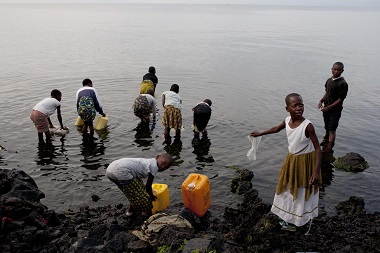|
|
 |
| World Water Day - 22 March 2014 |
|
Almost four years after the world met the global target set in the Millennium Development Goals (MDGs) for safe drinking water, and after the UN General Assembly declared that water was a human right, over three-quarters of a billion people, most of them poor, still do not have this basic necessity, UNICEF said to mark World Water Day.

Estimates from UNICEF and WHO published in 2013 are that a staggering 768 million people do not have access to safe drinking water, causing hundreds of thousands of children to sicken and die each year. Most of the people without access are poor and live in remote rural areas or urban slums.
UNICEF estimates that 1,400 children under five die every day from diarrhoeal diseases linked to lack of safe water and adequate sanitation and hygiene.
“Every child, rich or poor, has the right to survive, the right to health, the right to a future,” said Sanjay Wijesekera, head of UNICEF’s global water, sanitation and hygiene programmes. “The world should not rest until every single man, woman and child has the water and sanitation that is theirs as a human right.”
The MDG target for drinking water was met and passed in 2010, when 89 per cent of the global population had access to improved sources of drinking water — such as piped supplies, boreholes fitted with pumps, and protected wells. Also in 2010, the UN General Assembly recognized safe drinking water and sanitation as a human right, meaning every person should have access to safe water and basic sanitation. However, this basic right continues to be denied to the poorest people across the world.
“What continues to be striking, and maybe even shocking, is that even in middle income countries there are millions of poor people who do not have safe water to drink,” Wijesekera added. “We must target the marginalized and often forgotten groups: those who are the most difficult to reach, the poorest and the most disadvantaged.”
According to UNICEF and WHO estimates, 10 countries are home to almost two-thirds of the global population without access to improved drinking water sources. They are: China (108 million); India (99 million); Nigeria (63 million); Ethiopia (43 million); Indonesia (39 million); Democratic Republic of the Congo (37 million); Bangladesh (26 million); United Republic of Tanzania (22 million); Kenya (16 million) and Pakistan (16 million).
UNICEF says women and girls are disproportionately affected by lack of access to safe water. An estimated 71 per cent of the burden of drinking water collection is being shouldered by women and girls.
UNICEF WASH programming is taking place in over 100 countries, and new initiatives such as cost-effective drilling and community-based water safety planning are bringing safe water to families living in some of the most isolated regions. UNICEF has, for example, used hand-dug boreholes in Pakistan to supply safe water to around 100,000 people since 2012. UNICEF-supported ‘WASH in Schools’ programming has brought safe water, sanitation and hygiene facilities to millions of school children around the world.
This week, UNICEF launched a global social media campaign to demand action for the 768 million people without access to safe water. Followers on Facebook, Twitter and Instagram will be asked to discuss what water means to them through the use of photography and the hashtag #WaterIs to help raise awareness of what it means to live without access to safe drinking water.
MOST POPULAR IN LAST 24 HRS
MOST POPULAR IN LAST 7 DAYS
|
|
| |
 |
| Click here to request a copy of How To Reduce Your Carbon Footprint? |
|
 |
| Click here to request a copy of useful Eco Jargon. |
|
 |
| Click here to request
a copy of Non Green Numbers by Go Green. |
|
 |
 |
| Click here to request a copy of 10 Practical Ways to Go Green. |
|
 |
| Click here to request a copy of Facts About Global Warming. |
|
 |
| Click here to request a copy of Top 10 Reasons to Recycle. |
|
 |
 |
| Click here to request a copy of Carbon Neutrality, Carbon Emissions and Carbon Offsets. |
|
 |
| Click here to request a copy of How To Go Green at Work? |
|
 |
| Click here to request a copy of How To Go Green at Home? |
|
 |
 |
| Click here to request a copy of The Power of the sun - Glossary of solar terms. |
|
 |
| Click here to request a copy of The Carbon Lexicon - Reduction in emissions of carbon or greenhouse gases. |
|
 |
| Click here to request a copy of Carbon Emission Stats - Per Country, Per Capita. |
|
 |
|
|
|
|